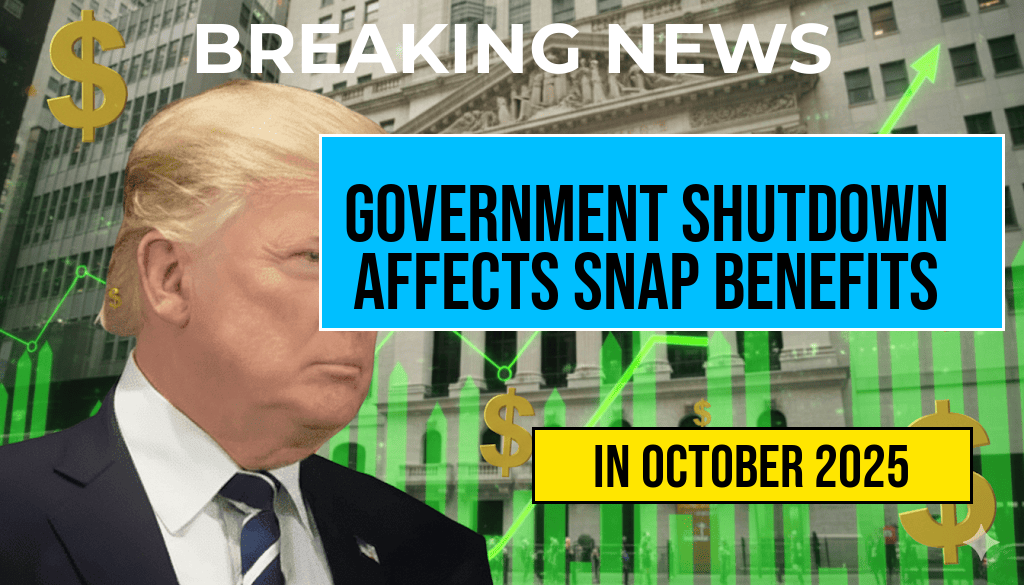The ongoing government shutdown has raised significant concerns regarding the future of the Supplemental Nutrition Assistance Program (SNAP), commonly known as food stamps. As millions of Americans rely on this crucial assistance for their daily nutrition, the consequences of the shutdown could be severe. The U.S. Department of Agriculture (USDA) has indicated that without a federal budget, SNAP benefits may face disruptions, affecting food security for low-income families across the nation. This article delves into what individuals and families can expect regarding their SNAP benefits amidst the government impasse.
Understanding the SNAP Program
SNAP is a federal aid program designed to provide nutritional assistance to eligible low-income individuals and families. Administered by the USDA, it aims to alleviate hunger and improve the nutritional quality of diets among those who face food insecurity. Benefits are typically distributed monthly through electronic benefit transfer (EBT) cards, which can be used like debit cards at authorized retailers.
Impact of Government Shutdown on SNAP
The current government shutdown, now entering its third week, has raised alarms about the viability of SNAP benefits for millions. The USDA has confirmed that while benefits for October have already been issued, the continuation of these benefits for subsequent months is uncertain. With funding for many federal programs stalled, there are concerns about the department’s ability to disburse funds for SNAP in November and beyond.
Current Status of SNAP Benefits
- October Benefits: All benefits for October have been processed and distributed.
- November Benefits: The USDA has not yet confirmed whether payments will be made for November, pending the resolution of the shutdown.
- Eligibility Requirements: Eligibility for SNAP benefits remains unchanged during the shutdown, but processing of new applications may be delayed.
Projected Outcomes if the Shutdown Continues
If the government shutdown persists, several scenarios could unfold regarding SNAP:
- Delayed Payments: New applicants may face significant delays in processing times, potentially leaving many without assistance.
- Reduced Benefits: Future benefits could be reduced if the shutdown continues into the next fiscal period, impacting food security for vulnerable populations.
- State-Level Responses: Some states may attempt to mitigate the impact by using emergency funds or state resources to bridge gaps.
What Can Beneficiaries Do?
While the situation remains fluid, there are steps individuals and families can take to prepare for potential changes in SNAP benefits:
- Stay Informed: Beneficiaries should regularly check the USDA’s official website and local announcements for updates on SNAP benefit distributions.
- Contact Local Offices: For specific questions regarding personal SNAP cases, individuals are encouraged to reach out to local SNAP offices for guidance.
- Explore Additional Resources: Organizations like Feeding America and local food banks may offer additional support during this uncertain time.
Long-term Considerations
As discussions around the budget continue, lawmakers are under pressure to prioritize funding for crucial programs like SNAP. Historically, SNAP has received bipartisan support, but the current political climate could complicate funding decisions. Advocacy groups are urging Congress to act swiftly to ensure that food assistance programs are not adversely affected by fiscal negotiations.
Advocacy and Support
Community organizations and advocacy groups emphasize the importance of maintaining SNAP funding. According to a report by Feeding America, nearly 40 million Americans rely on SNAP, and any disruption could lead to significant increases in hunger and food insecurity.
Conclusion
The ongoing government shutdown poses a serious threat to the stability of SNAP benefits for millions of Americans. While October benefits have been issued, uncertainty looms over future payments. It is crucial for beneficiaries to stay informed and prepared as the situation develops. The resolution of the shutdown will ultimately determine the fate of SNAP and the well-being of those who depend on it for their nutritional needs.
Frequently Asked Questions
What is the impact of a government shutdown on SNAP benefits?
A government shutdown can lead to delays in SNAP benefits distribution, affecting many families who rely on these funds for food assistance.
Will food stamp recipients still receive their benefits during a shutdown?
During a government shutdown, food stamp recipients may receive their benefits for a limited time, but future payments could be delayed or reduced depending on the duration of the shutdown.
How long can a government shutdown last and affect SNAP?
The length of a government shutdown can vary, and the longer it lasts, the greater the potential impact on SNAP benefits, which may lead to uncertainty for recipients.
What steps can SNAP beneficiaries take during a government shutdown?
SNAP beneficiaries should stay informed about the status of their benefits and consider budgeting their current resources to prepare for any potential delays.
Are there any support resources available for those affected by SNAP changes?
Yes, local food banks and community organizations often provide additional support during government shutdowns, helping those affected by SNAP changes.

Leave a Reply